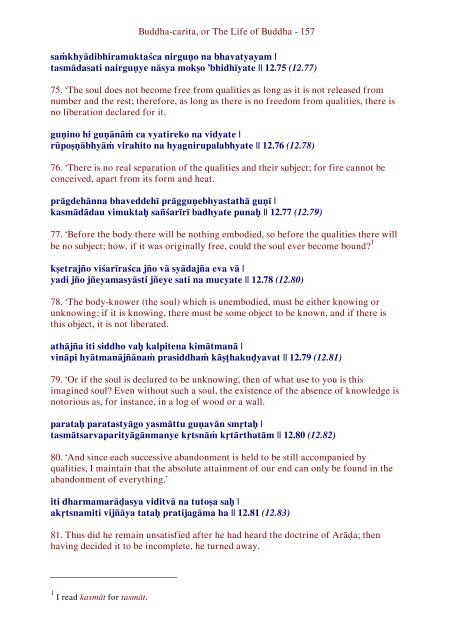The Buddha-Carita or The Life of Buddha by Ven. Aśvaghoṣa
A Sanskrit and English line by line (interlinear) version of one of the most important and influential biographies of the Buddha (together with extensive annotation).
A Sanskrit and English line by line (interlinear) version of one of the most important and influential biographies of the Buddha (together with extensive annotation).
You also want an ePaper? Increase the reach of your titles
YUMPU automatically turns print PDFs into web optimized ePapers that Google loves.
<strong>Buddha</strong>-carita, <strong>or</strong> <strong>The</strong> <strong>Life</strong> <strong>of</strong> <strong>Buddha</strong> - 157<br />
sakhyādibhiramuktaśca nirguṇo na bhavatyayam |<br />
tasmādasati nairguṇye nāsya mokṣo ’bhidhīyate || 12.75 (12.77)<br />
75. ‘<strong>The</strong> soul does not become free from qualities as long as it is not released from<br />
number and the rest; theref<strong>or</strong>e, as long as there is no freedom from qualities, there is<br />
no liberation declared f<strong>or</strong> it.<br />
guṇino hi guṇānā ca vyatireko na vidyate |<br />
rūpoṣṇābhyā virahito na hyagnirupalabhyate || 12.76 (12.78)<br />
76. ‘<strong>The</strong>re is no real separation <strong>of</strong> the qualities and their subject; f<strong>or</strong> fire cannot be<br />
conceived, apart from its f<strong>or</strong>m and heat.<br />
prāgdehānna bhaveddehī prāgguṇebhyastathā guṇī |<br />
kasmādādau vimuktaḥ sañśarīrī badhyate punaḥ || 12.77 (12.79)<br />
77. ‘Bef<strong>or</strong>e the body there will be nothing embodied, so bef<strong>or</strong>e the qualities there will<br />
be no subject; how, if it was <strong>or</strong>iginally free, could the soul ever become bound? 1<br />
kṣetrajño viśarīraśca jño vā syādajña eva vā |<br />
yadi jño jñeyamasyāsti jñeye sati na mucyate || 12.78 (12.80)<br />
78. ‘<strong>The</strong> body-knower (the soul) which is unembodied, must be either knowing <strong>or</strong><br />
unknowing; if it is knowing, there must be some object to be known, and if there is<br />
this object, it is not liberated.<br />
athājña iti siddho vaḥ kalpitena kimātmanā |<br />
vināpi hyātmanājñāna prasiddha kāṣṭhakuḍyavat || 12.79 (12.81)<br />
79. ‘Or if the soul is declared to be unknowing, then <strong>of</strong> what use to you is this<br />
imagined soul? Even without such a soul, the existence <strong>of</strong> the absence <strong>of</strong> knowledge is<br />
not<strong>or</strong>ious as, f<strong>or</strong> instance, in a log <strong>of</strong> wood <strong>or</strong> a wall.<br />
parataḥ paratastyāgo yasmāttu guṇavān smtaḥ |<br />
tasmātsarvaparityāgānmanye ktsnā ktārthatām || 12.80 (12.82)<br />
80. ‘And since each successive abandonment is held to be still accompanied <strong>by</strong><br />
qualities, I maintain that the absolute attainment <strong>of</strong> our end can only be found in the<br />
abandonment <strong>of</strong> everything.’<br />
iti dharmamarāḍasya viditvā na tutoṣa saḥ |<br />
aktsnamiti vijñāya tataḥ pratijagāma ha || 12.81 (12.83)<br />
81. Thus did he remain unsatisfied after he had heard the doctrine <strong>of</strong> Arāḍa; then<br />
having decided it to be incomplete, he turned away.<br />
1 I read kasmāt f<strong>or</strong> tasmāt.


















